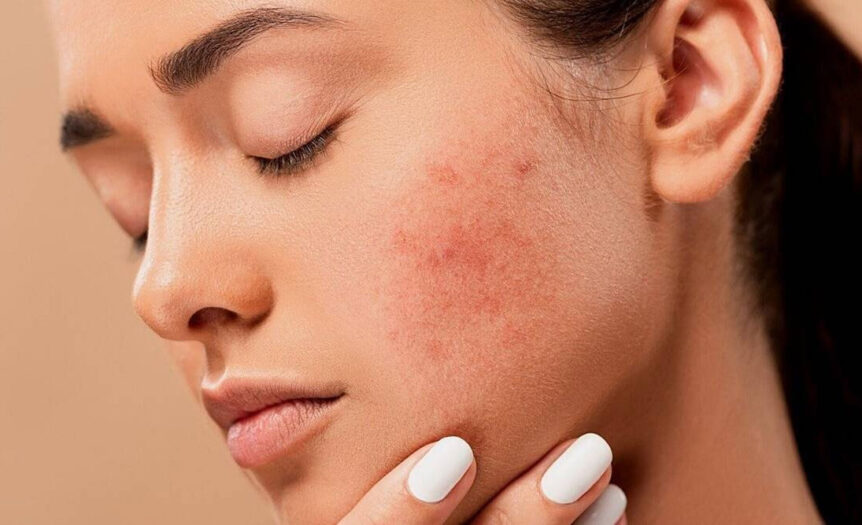In sunny Florida, our skin often takes a beating from the tropical heat, environmental pollutants and the aging process. Skin redness can be a common and frustrating issue for many. However, there is a variety of strategies that can be employed to minimize this concern. As a board-certified dermatologist and the founder and medical director of MiamiDerm, I, Dr. Anna Chacon, have helped countless patients manage their skin redness both in person in Coral Gables and as a teledermatologist in 53 jurisdictions.
- Understand the Cause
Understanding the underlying cause of skin redness is crucial. It can be a symptom of conditions like rosacea or eczema or a reaction to a product or allergen. Consulting with a dermatologist can help pinpoint the cause and guide your treatment strategy. - Sun Protection
Florida’s sunshine can exacerbate skin redness. Wearing a broad-spectrum sunscreen with a sun-protection factor (SPF) of 30 or higher, even on cloudy days, can prevent further damage and redness. - Choose the Right Skin Care Products
Opt for hypoallergenic, fragrance-free products that are less likely to irritate the skin. Ingredients like aloe vera, chamomile, green tea and cucumber can soothe inflamed skin. - Incorporate a Gentle Cleansing Routine
A harsh cleansing routine can strip the skin of its natural oils, causing redness. Use a gentle, hydrating cleanser and avoid scrubbing your face. - Hydrate
Keeping the skin and the body well hydrated can help reduce skin redness. Drink plenty of water and choose moisturizers with hyaluronic acid or ceramides. - Healthy Diet
A diet rich in antioxidants and omega-3 fatty acids can help reduce inflammation and redness. Include lots of fruits, vegetables and fatty fish in your diet. - Medical Treatments
If redness persists, medical treatments such as laser therapy, prescription creams or oral medications may be recommended by your dermatologist.
While skin redness can be bothersome, a combination of understanding the cause, protecting the skin, choosing suitable skin care products, maintaining a gentle cleansing routine, staying hydrated, eating a healthy diet and seeking medical advice when necessary can help manage and minimize it. Remember, every person’s skin is different, and what works for one may not work for another. Therefore, it’s essential to consult with a dermatologist to develop a personalized skin care routine. As a dermatology expert based in Florida, I am here to guide you on this journey towards healthier, more comfortable skin.










 Deering Estate
Deering Estate
 Massage Envy South Miami
Massage Envy South Miami
 Calla Blow Dry
Calla Blow Dry
 My Derma Clinic
My Derma Clinic
 Sushi Maki
Sushi Maki
 Sports Grill
Sports Grill
 The Healthy Kitchen
The Healthy Kitchen
 Golden Rule Seafood
Golden Rule Seafood
 Malanga Cuban Café
Malanga Cuban Café

 Kathleen Ballard
Kathleen Ballard
 Panter, Panter & Sampedro
Panter, Panter & Sampedro
 Vintage Liquors
Vintage Liquors
 The Dog from Ipanema
The Dog from Ipanema
 Rubinstein Family Chiropractic
Rubinstein Family Chiropractic
 Your Pet’s Best
Your Pet’s Best
 Indigo Republic
Indigo Republic




 ATR Luxury Homes
ATR Luxury Homes


 2112 Design Studio
2112 Design Studio
 Hamilton Fox & Company
Hamilton Fox & Company
 Creative Design Services
Creative Design Services
 Best Pest Professionals
Best Pest Professionals
 HD Tree Services
HD Tree Services
 Trinity Air Conditioning Company
Trinity Air Conditioning Company
 Cisca Construction & Development
Cisca Construction & Development
 Mosquito Joe
Mosquito Joe
 Cutler Bay Solar Solutions
Cutler Bay Solar Solutions


 Miami Royal Ballet & Dance
Miami Royal Ballet & Dance
 Christopher Columbus
Christopher Columbus
 Pineview Preschools
Pineview Preschools
 Westminster
Westminster
 Carrollton
Carrollton
 Lil’ Jungle
Lil’ Jungle
 Frost Science Museum
Frost Science Museum
 Palmer Trinity School
Palmer Trinity School
 South Florida Music
South Florida Music
 Pinecrest Orthodontics
Pinecrest Orthodontics
 Dr. Bob Pediatric Dentist
Dr. Bob Pediatric Dentist
 d.pediatrics
d.pediatrics
 South Miami Women’s Health
South Miami Women’s Health

 The Spot Barbershop
The Spot Barbershop
 My Derma Clinic
My Derma Clinic




 Miami Dance Project
Miami Dance Project

 Rubinstein Family Chiropractic
Rubinstein Family Chiropractic
 Indigo Republic
Indigo Republic

 Safes Universe
Safes Universe
 Vintage Liquors
Vintage Liquors
 Evenings Delight
Evenings Delight





 Atchana’s Homegrown Thai
Atchana’s Homegrown Thai
 Baptist Health South Florida
Baptist Health South Florida

 Laser Eye Center of Miami
Laser Eye Center of Miami
 Visiting Angels
Visiting Angels
 OpusCare of South Florida
OpusCare of South Florida

 Your Pet’s Best
Your Pet’s Best





 HD Tree Services
HD Tree Services
 Hamilton Fox & Company
Hamilton Fox & Company


 Creative Design Services
Creative Design Services